Myth vs Reality : clearing up some common misunderstandings about infertility
In our society, infertility is often surrounded by misconceptions and myths, leading to misunderstanding and unnecessary stigma. In this article, we’ll talk about the differences between what people believe about infertility and what’s really true. We’ll discuss common misunderstandings and explain the real facts about fertility challenges, giving accurate info to those going through this tough time. Let’s dive into the world of Infertility Myths vs Reality!
Myth: Infertility is Always a Woman’s Problem.
Reality: Both men and women can face infertility. While people often talk about problems like issues with women’s ovulation or fallopian tubes, men can also have problems like low sperm count or not-so-great sperm quality. In fact, about one-third of infertility cases happen because of problems with men, another third because of problems with women, and the rest because of issues with both partners or reasons we don’t know yet.
Myth: Couples should always try for at least a year before seeing an OBGYN.
Reality: Infertility is often described as trying to have a baby for a year without success, but this isn’t set in stone. Lots of couples might need help sooner. For instance, if a woman is over 35, has irregular periods, fibroids, endometriosis, or has had many miscarriages, or if a man has had surgeries, infections, or injuries to his private parts, they should think about getting help earlier.
Myth: Infertility is Always Caused by Stress.
Reality: While stress can impact reproductive health, it’s rarely the sole cause of infertility. Many other factors, such as hormonal imbalances, structural issues, or underlying medical conditions, play significant roles in fertility challenges. While managing stress is essential for overall well-being, it’s unlikely to resolve infertility on its own.
Reality: Stress can affect having a baby, but it usually isn’t the only reason for infertility. There are other important things like hormone problems, body structure issues, or health problems that can make it hard to get pregnant. While it’s good to handle stress for your health, just doing that probably won’t solve infertility by itself.
Myth: Infertility Only Affects Older Women.
Reality: Infertility isn’t just for older women. Even though getting older can make it harder to have a baby because of changes in eggs, anyone can have trouble getting pregnant. Things like hormone issues, genes, or how you live can also make it tough for younger people to have babies. But, lots of women who are 35 or older still have babies and everything goes well.
Myth: If a man can ejaculate, he’s not infertile.
Reality: Male infertility isn’t just about ejaculation. It’s more complicated than that. Low sperm count is a big reason, but how the sperm moves (motility) and its shape (morphology) also matter. Many men with infertility don’t show any obvious signs of a problem.
Myth: Infertility is Always Treatable with IVF.
Reality: IVF (in vitro fertilization) is a good way to help people have babies, but it’s not right or needed for everyone who can’t get pregnant. The treatment you get depends on why you can’t have a baby. It might include things like changing how you live, taking fertility drugs, having surgery, or trying other ways to help you get pregnant, like IUI (intrauterine insemination). IVF is just one choice among many.
Myth: Using birth control can cause infertility.
Reality: Birth control pills don’t really change your chances of getting pregnant, either good or bad. When you stop taking them, your period usually goes back to normal pretty quickly, within a month or two. But if it doesn’t get back to normal in three months, it’s smart to talk to a doctor who knows about women’s health. Infertility is more common than you might think. It affects about 1 in 8 couples all over the world. Infertility is a health problem that can happen to anyone, no matter how old they are, what race they are, or how much money they have.
Myth: Adoption is the Only Solution for Infertility.
Reality: Adoption is a wonderful way to have a family, but it’s not the only choice for people who can’t have babies. There are other ways to become parents, like using treatments to help with fertility, having someone else carry the baby for you (surrogacy), or trying different ways to build your family. Everyone’s journey to having a family is different, so it’s important to know about all the options before making decisions.
By explaining the truth about infertility and giving the right information, we can make people understand more and stop them from feeling bad about it. This helps people who are having trouble having babies to get the help they need and not feel alone. Infertility is complicated, but with knowledge and help, people can go through it with strength and optimism.
Please click here to schedule an appointment with our infertility specialist, Dr. Tumla.

